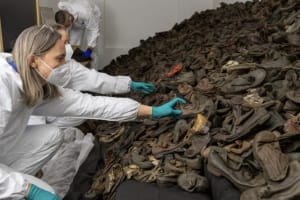Visitors seen at the Yad Vashem Holocaust Memorial Museum in Jerusalem May 2, 2024, ahead of Israeli Holocaust Remembrance Day. (Photo by Yonatan Sindel/Flash90)
For the first time since the Oct. 7 massacre, 150 educators from all over the world are convening in Jerusalem for Yad Vashem’s International Holocaust Educational Conference this week, seeking to deal with the new challenges presented at this particular time in history.
If there have been concerns that the brutality of what took place on Oct. 7 has already been forgotten in just a few short months, how much more the Holocaust.
The importance of understanding how the Holocaust happened has been highlighted against the backdrop of antisemitism continuing to rise unabated.
The regular demonization of Zionists, the Jewish state of Israel and Jews in general has become normalized and often left unchallenged, in an atmosphere reminiscent of the rise of the Third Reich.
Holocaust educators hope to make “never again” a reality, rather than a wish, by raising awareness about how one step leads to another on the path to genocide.
Seeking to promote accurate and meaningful Holocaust education, educators from some 40 countries will meet on the Mount of Remembrance in Jerusalem for a four day conference entitled, “Holocaust Education in a Global Context.”
The Yad Vashem Holocaust Remembrance Center explained that the conference is divided into four parts: The Kehila: The Jewish Community in a World Crisis; Holocaust in a Global Context; Holocaust Education and New Media; and “When Antisemitism Challenges Holocaust Education.”
Delegates will listen to the firsthand account of Liat Atzili, an Israeli hostage who was released from Hamas captivity and saw her husband murdered on Oct. 7.
Atzili, a Yad Vashem guide and holocaust educator, will address the participants on the second day of the conference.
One issue facing Holocaust educators is the declining number of Holocaust survivors each year, as the need for Holocaust education becomes all the more pressing in their absence. When there are no more “living witnesses” to testify about what happened, the challenge of passing on the lessons of the Holocaust will take on a new dimension.
In a new report, UNESCO highlighted the challenges presented by the use and abuse of artificial intelligence (AI) regarding Holocaust information. The UN body warned that, if left unchecked, AI will lead to a distortion of the historical facts, given the amount of Holocaust distortion and denial pervading online sources that AI draws from
The chairman of Yad Vashem, Dani Dayan, explained why the conference was particularly important in the current climate.
“At a time when antisemitism is exploding around the world, we are seeing more and more rampant Holocaust distortion and inversion in mainstream society. This conference is not just a meeting of the minds of educators, who are charged with teaching the Holocaust to our younger generations,” Dayan explained.
“It is a message of unwavering commitment to history and a signal to our educational leaders that Holocaust education is essential not only for imparting knowledge and awareness but also as a crucial tool for fostering a more tolerant and open society.”
The German treasury, persuaded by the growing need to invest in Holocaust education, recently designated an extra €51 million ($56 million), along with a €105 million ($114 million) increase in funding for social welfare services for survivors.
“In this time of growing Holocaust denial and distortion, it is critical that we secure a robust foundation for Holocaust education to ensure current and future generations alike have access and opportunities to truly understand the lessons of the Holocaust,” said Greg Schneider, the vice president of the Claims Conference.
Dr. Gilad Olstein, director of Yad Vashem’s International Institute for Holocaust Education and head of the International Conference, also expressed the urgency to respond to the current need.
“Holocaust education faces unprecedented challenges in our modern world… This gathering of over 150 educators is not only a testament to the global dedication to Holocaust education, but also an opportunity to discuss these challenges and best equip these educators with the latest tools, methodologies, and resources to effectively teach the Holocaust.”

































